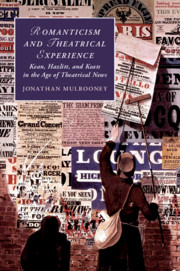Book contents
- Romanticism and Theatrical Experience
- Cambridge Studies in Romanticism
- Romanticism and Theatrical Experience
- Copyright page
- Dedication
- Contents
- Figures
- Acknowledgments
- Introduction
- Part I The Making of British Theater Audiences
- Part II Theater and Late Romanticism
- Chapter 3 Edmund Kean’s Controversy
- Chapter 4 Hazlitt’s Romantic Occasionalism
- Chapter 5 Keats, Kean, and the Poetics of Interruption
- Bibliography
- Index
- Cambridge Studies in Romanticism
Chapter 5 - Keats, Kean, and the Poetics of Interruption
from Part II - Theater and Late Romanticism
Published online by Cambridge University Press: 31 December 2018
- Romanticism and Theatrical Experience
- Cambridge Studies in Romanticism
- Romanticism and Theatrical Experience
- Copyright page
- Dedication
- Contents
- Figures
- Acknowledgments
- Introduction
- Part I The Making of British Theater Audiences
- Part II Theater and Late Romanticism
- Chapter 3 Edmund Kean’s Controversy
- Chapter 4 Hazlitt’s Romantic Occasionalism
- Chapter 5 Keats, Kean, and the Poetics of Interruption
- Bibliography
- Index
- Cambridge Studies in Romanticism
Summary
- Type
- Chapter
- Information
- Romanticism and Theatrical ExperienceKean, Hazlitt and Keats in the Age of Theatrical News, pp. 191 - 235Publisher: Cambridge University PressPrint publication year: 2019



